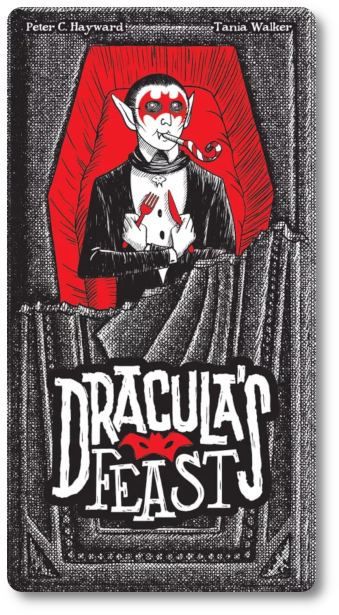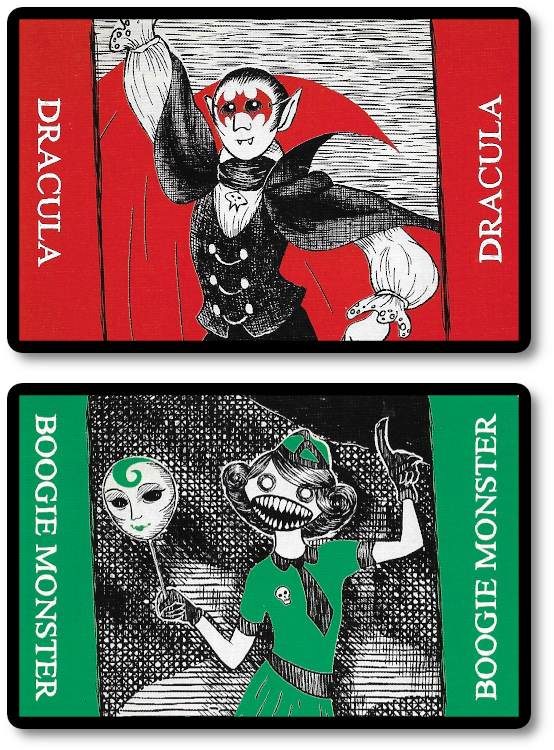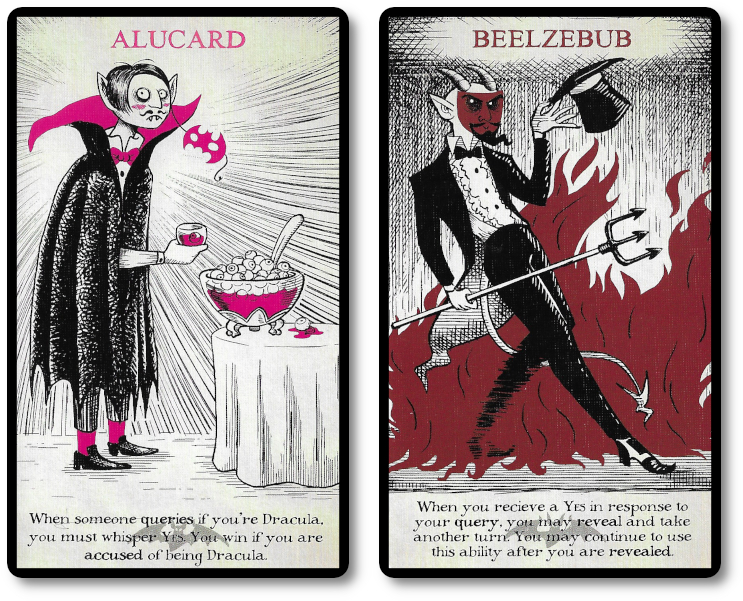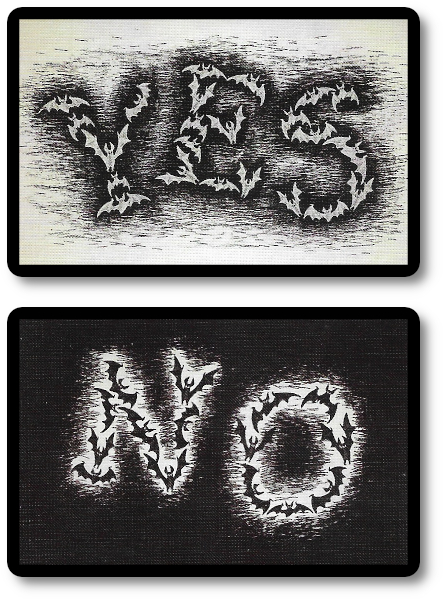
The Basics:
- For ages 10 and up
- For 4 to 8 players
- Approximately 15 minutes to complete
Geek Skills:
- Active Listening & Communication
- Logical & Critical Decision Making
- Reading
- Strategy & Tactics
- Risk vs. Reward
- Self-confidence
- Imagination
- Bluffing and Misdirection
Learning Curve:
- Child – Easy
- Adult – Easy
Theme & Narrative:
- Welcome to the party! Try to stay hidden among the crowd as long as you can…
Endorsements:
- Gamer Geek approved!
- Parent Geek approved!
- Child Geek approved!
Overview
American novelist, newspaper, and magazine editor in the late 19th and early 20th centuries known for his sharp wit, E. W. Howe, said, “To be an ideal guest, stay at home.” Dracula is holding the biggest party of the year, but not everyone attending was invited. Now Dracula is less than pleased and is threatening to throw everyone out, but if you can unmask the unwanted guests before you are shown the door, the party can continue. The problem is, you might be the unwanted guest, and no one wants the party to end.
Dracula’s Feast, designed by Peter C. Hayward and published by Jellybean Games, is comprised of 13 Guest cards, 13 Accusation cards, 20 Reference cards, and 20 Whisper cards. Component quality is excellent with durable cards throughout. Artwork by Tania Walker is stylized, colorful, and fun, further strengthening the game’s theme and narrative.
Getting Ready to Party
To set up the game, first randomly choose or purposely select Guest cards resulting in a total number greater than the number of players by one. For example, if playing with five individuals, select six Guest cards. One of these Guest cards must always be “Dracula.” Note that there are a few “advanced” Guest cards included in the game. While these do not make the game more complicated, these Guest cards have special abilities that might not be easy to grasp for players unfamiliar with the game. The rule book does an excellent job suggesting what Guests to start with and breaking down each of the Guest card’s special abilities. Return any Guest cards not selected back into the game box.
Second, find the matching Accusation cards for each selected Guest, placing them face-up in the middle of the playing area. Ensure all the players can easily see these cards from their seated or standing position (honestly, this game is so fast, you don’t need to sit down for it). Return any Accusation cards not used back to the game box.

Third, give each player a set of Whisper cards (“Yes” and “No”). Finally, place any Whisper cards not used back in the game box.
Fourth, shuffle the Guest cards (except “Dracula”), and then deal one face-down to the middle of the playing area. This Guest card is considered the “Mystery Guest.” Finally, shuffle the remaining Guest cards (including “Dracula”) and deal one to each player face-down. Players should look at their Guest card and keep it hidden until revealed later in the game. Players should take special note regarding their Guest card’s special ability.
This completes the game setup. Determine who will go first and go party!
The Invitee List
Dracula’s Feast comes with 13 Guest cards. Each represents a monster who is attending the party that comes with its own bag of tricks.
- “Dracula” is the host of the party and can accuse twice in a single turn.
- “Alucard” will always answer “Yes” if any player asks if they are “Dracula.” Thus, “Alucard” wins the game if they are accused of being “Dracula.”
- “Beelzebub” can reveal themselves and then take another turn if they received a “Yes” during a query.
- “Boogie Monster” must accept all dance requests and can accuse immediately after any dance during the game, even if they are rejected.
- “Doctor Jekyll” must reveal their Guest card before querying an opponent, but then switches their Guest card with the “Mystery Guest”!
- “Trickster” must always answer “Yes” when queried but must answer honestly when accused.
- “Van Helsing” can win the game when accusing, but only if correctly accusing the player they believe is Dracula.
- “Werewolf” must accept all dance requests. When an opponent announces they will accuse, the Werewolf may accuse first, accusing out of turn.
- “Zombie” must accept all dance requests but can never ask for a dance. When accusing, they only target the opponents to their immediate left and right.
- “Bride of Dracula” must answer “Yes” if asked if they are Dracula. If they respond “No” to any query, they immediately reveal the Guest card of the opponent querying them and can then accuse others out of turn.
- “Captain Bluebeard” may reveal their Guest card to look at the Guest cards involved in any dance secretly. They may also reveal their Guest card to look a the Whisper cards being passed by any opponent. When someone is accusing, they may reveal their Guest card to look at one Whisper card passed in response.
- “Magic Mirror” gets to see who the Mystery Guest is at the start of the game.
- “Swamp Thing” passes Accusation cards face-down instead of face-up. They also only reveal “Yes” Whisper cards in response to accusations.
Each of the Guest cards summarizes the individual guest’s abilities, too.

The “Unlife” of the Party
Dracula’s Feast is played in turns with no set number of turns per game. During a player’s turn, they must take one of three possible actions. Each of these actions is summarized here. During the game, table talk is not only encouraged but a necessary component of gameplay. Feel free to lie, say outrageous things, and even suggest some players are doing the same, but all players must be honest with their query responses unless their Guest card suggests otherwise.
Query
This action allows the player to select any other opponent and ask them, out loud, if they are one of the face-up Accusation cards. For example, “Are you the Zombie?”. The targeted opponent must now pass to the player the “Yes” or “No” Whisper card face-down. By default, all players must answer truthfully unless their Guest card’s special ability states otherwise. This is an important point to make, as it’s perfectly possible and acceptable to lie like dogs when bantering back and forth with table talk.
Once the Whisper card is passed, the player looks at it (making sure no other players can see it) and then returns it face-down.
Dance
This action allows the player to select any other opponent and ask them to dance. If the opponent accepts, the two players exchange Guest cards, making sure no other players can see them. Any player can refuse to dance without penalty.
Accuse
This action should be taken with caution and is the default way for the player to win. However, some Guest cards come with additional and alternative means to win, as well.
If the player wishes to accuse their opponents, singling them out and informing all who that opponent’s Guest card is, they announce it to the table with as much bravado as one can muster. Remember, all the possible Guests at this party are noted with the face-up Accusation cards at the table. Feel free to give other players a moment to respond with gasps or incredulous commentary.
The player selects the Accusation cards they believe the accused opponent holds and places one in front of each of their opponents. The player then reveals their Guest card, flipping it face-up.
Each opponent now selects a Whisper card and hands it to the active player face-down. They pass a “Yes” if the Accusation card in front of them matches their Guest card or a “No” if it does not. Next, the player takes the passed Whisper cards, shuffles them, and then reveals them face-up to the table.
- If all the Whisper cards are a “Yes,” the player wins the game!
- If any of the Whisper cards are a “No,” the game continues. Collect all the “Yes” and “No” Whisper cards, shuffle, and give each player a new set. Finally, return the Accusation cards to the middle of the playing area.

A few notes regarding the Guest cards and general gameplay:
- Once a Guest card is revealed (placed face-up), it remains visible to all the players for the game’s duration. Any special abilities, advantages, or drawbacks are ignored at the end of the player’s turn and for the game’s duration.
- No player, even if their Guest card is revealed, is out of the game. Unmasked guests can still win!
- The “Mystery Guest” can never be queried or asked to dance. Instead, an Accusation card is assigned to it when the Accuse action is selected, but no Whisper card is passed to represent it.
- Players are encouraged to remember what they are hearing and seeing when the game is being played. However, if the group decides it’s acceptable, players can also take notes. This is a great way to play the game with a large group of people.
This completes the player’s turn. The next player in turn order sequence now takes their turn selecting one of the three aforementioned actions. This continues until the game is won.
Game Variant
Dracula’s Feast plays fairly quickly. If a longer game is desired, play with two “Mystery Guests.” Only one is shown if playing with the “Magic Mirror” Guest card.
To learn more about Dracula’s Feast, visit the game’s webpage.
Final Word
 The Child Geeks really enjoyed the game and its theme. For those Child Geeks who had played games like Are You A Werewolf? and other hidden role games, the objective, and gameplay came naturally. For those Child Geeks who were not, it took them a round or two to get into the swing of things, but they quickly found their footing and were as competitive as their more experienced peers. According to one Child Geek, “I like the game because it is a mystery. You have to solve it by asking questions and listening to others. The hardest part of the game was trying not to laugh when I knew who a player was!” Another Child Geek said, “The game was hard to understand at first because I didn’t understand how I was going to find out who the players were pretending to be. But after I saw it being played and how the questions were being asked, I knew exactly how I was going to win. And I did!” When the last party plate was cleaned, and the guests escorted out, the Child Geeks gave Dracula’s Feast their full approval.
The Child Geeks really enjoyed the game and its theme. For those Child Geeks who had played games like Are You A Werewolf? and other hidden role games, the objective, and gameplay came naturally. For those Child Geeks who were not, it took them a round or two to get into the swing of things, but they quickly found their footing and were as competitive as their more experienced peers. According to one Child Geek, “I like the game because it is a mystery. You have to solve it by asking questions and listening to others. The hardest part of the game was trying not to laugh when I knew who a player was!” Another Child Geek said, “The game was hard to understand at first because I didn’t understand how I was going to find out who the players were pretending to be. But after I saw it being played and how the questions were being asked, I knew exactly how I was going to win. And I did!” When the last party plate was cleaned, and the guests escorted out, the Child Geeks gave Dracula’s Feast their full approval.
 The Parent Geeks also enjoyed the game, finding it intuitive to play and highly engaging from start to finish. According to one Parent Geek, “Each of the guests is unique and has a little advantage over the others, but never to a point where I ever felt any player was clearly better positioned than another. I also didn’t feel like the game was too hard or too easy. It had the perfect Goldilocks feel to it. Just right.” Another Parent Geek said, “Perfect for parties, especially around Halloween. But I would play this again anytime. Christmas would be weird, but the game would still be a lot of fun.” When the final party favor popped and the ballons feel, the Parent Geeks all cheered for Dracula’s Feast.
The Parent Geeks also enjoyed the game, finding it intuitive to play and highly engaging from start to finish. According to one Parent Geek, “Each of the guests is unique and has a little advantage over the others, but never to a point where I ever felt any player was clearly better positioned than another. I also didn’t feel like the game was too hard or too easy. It had the perfect Goldilocks feel to it. Just right.” Another Parent Geek said, “Perfect for parties, especially around Halloween. But I would play this again anytime. Christmas would be weird, but the game would still be a lot of fun.” When the final party favor popped and the ballons feel, the Parent Geeks all cheered for Dracula’s Feast.
 The Gamer Geeks found Dracula’s Feast to be quick, easy to grasp, engaging, and unnecessarily heavy at times. According to one Gamer Geek, “I think the game is fine. It isn’t breaking any new ground here, and the gameplay is solid. There are so many characters, though, so I wonder if the game gets a bit heavy sometimes due to how many possibilities there are. The Accusation cards help, but if you play with a large group, yikes, it takes a bit to get your head straight on who might be who. This left me feeling like the game certainly has a sweet spot regarding the number of players. Still, I enjoyed it and would play it again if in the right mood.” Another Gamer Geek said, “A fun game that is all about misleading but never being false. That is where it becomes a real challenge. You want to trick and trap, but you have to do so with a straight face and never once tell a lie through the cards. Tricky. Tricky and fun. I enjoyed it.” When the cake was cut, the Gamer Geeks agreed that Dracula’s Feast was a good time for all.
The Gamer Geeks found Dracula’s Feast to be quick, easy to grasp, engaging, and unnecessarily heavy at times. According to one Gamer Geek, “I think the game is fine. It isn’t breaking any new ground here, and the gameplay is solid. There are so many characters, though, so I wonder if the game gets a bit heavy sometimes due to how many possibilities there are. The Accusation cards help, but if you play with a large group, yikes, it takes a bit to get your head straight on who might be who. This left me feeling like the game certainly has a sweet spot regarding the number of players. Still, I enjoyed it and would play it again if in the right mood.” Another Gamer Geek said, “A fun game that is all about misleading but never being false. That is where it becomes a real challenge. You want to trick and trap, but you have to do so with a straight face and never once tell a lie through the cards. Tricky. Tricky and fun. I enjoyed it.” When the cake was cut, the Gamer Geeks agreed that Dracula’s Feast was a good time for all.
 Dracula’s Feast found love with all our groups with very few players not enjoying it, and not a single one of our geeks found the game to be “bad” or “boring.” Just the opposite, in fact. What made the game a real treat for the individual player was how the game is played. You have to listen intensely to not only what is being said but what isn’t. It would be best if you watched the players as closely as you watch the table. And most importantly, be really sure you have your fake story straight, or others will find gaps in your armor and quickly go in for the kill. This is a lot of fun for gamers like me who play games mostly because of the engaging social interaction you get verbally and mentally. Some players, however, find this type of gameplay annoying or simply not their cup of tea. Regardless, everyone who had a chance to play enjoyed ourselves and the company we partied with.
Dracula’s Feast found love with all our groups with very few players not enjoying it, and not a single one of our geeks found the game to be “bad” or “boring.” Just the opposite, in fact. What made the game a real treat for the individual player was how the game is played. You have to listen intensely to not only what is being said but what isn’t. It would be best if you watched the players as closely as you watch the table. And most importantly, be really sure you have your fake story straight, or others will find gaps in your armor and quickly go in for the kill. This is a lot of fun for gamers like me who play games mostly because of the engaging social interaction you get verbally and mentally. Some players, however, find this type of gameplay annoying or simply not their cup of tea. Regardless, everyone who had a chance to play enjoyed ourselves and the company we partied with.
The “advanced” Guests truly are just that. I don’t recommend they be played with at first. They bring to the game subtle means and ways to get around questions and dive deeper into gameplay that is not intuitive if you are unfamiliar with the game. That said, I highly recommend they are added to the rotation once the players finish their first game. While they are advanced as far as how they allow players to interact with others, the game is intuitive enough to quickly teach players all they need to know in a single game, allowing for additional rules to be easily absorbed by the mind.
Do play this delightfully creepy hidden role game. It has just enough “bite” to keep you hooked and will satisfy the detective in you, and that’s no lie.
This game was given to Father Geek as a review copy. Father Geek was not paid, bribed, wined, dined, or threatened in vain hopes of influencing this review. Such is the statuesque and legendary integrity of Father Geek.




Pingback: Dracula's Feast: Cthulhu and Friends Game Expansion Review - Father Geek